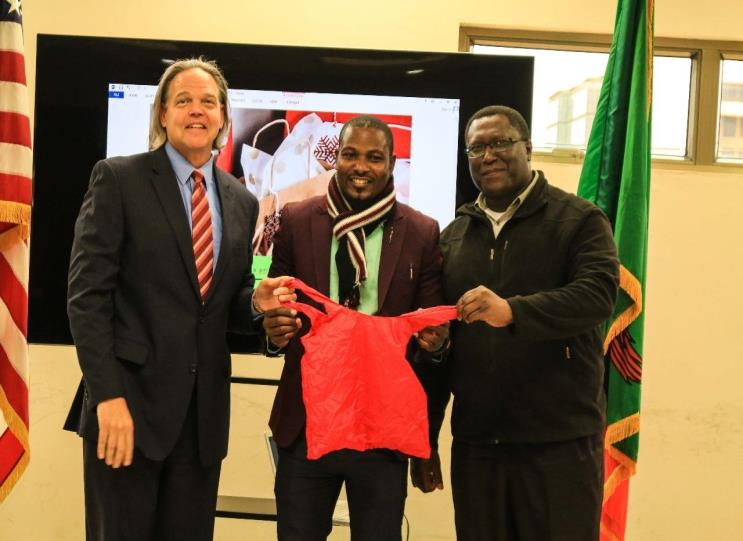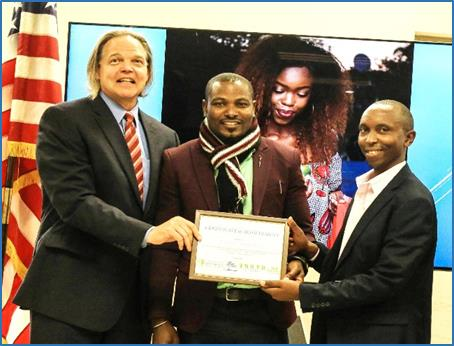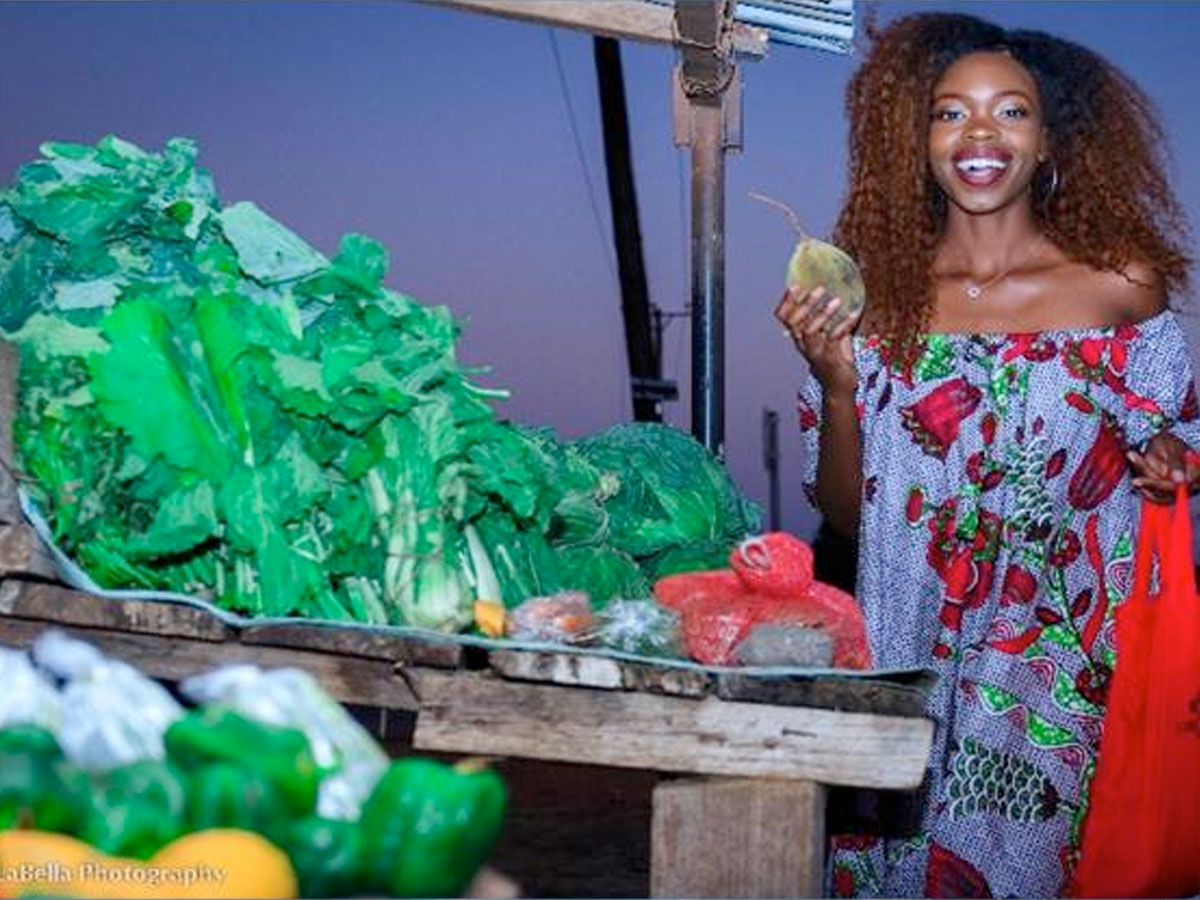#KathumbaBag is a reusable bag that can be utilized countless times. Made of a strong material and can be kept conveniently in a cloth that would otherwise have been wasted, the #KathumbaBag is an ideal replacement for consumer’s groceries, replacing single-use plastic bags. Introducing the #KathumbaBag in Lusaka’s market can be a great way for consumers to shop without imposing waste on the environment. Some long-term goals the Center for Zero Waste strives to achieve are the elimination of single-use bags and to increase public awareness of Zero Waste strategies in which individuals can be conscious consumers.
Current ways to achieve public awareness is by hosting talks on radio stations and enabling discussions with relevant stakeholders as methods to strengthen digital media and publications. Zero Waste strategies are important to instill in society as each member in society can contribute to initiatives pertaining to a circular economy, whether they are a producer of a good or a consumer of that good. Providing technical support to Zero Waste Ambassador & Former Miss Zambia, Michelo Malambo shopping at a local market with a #KathumbaBag Practitioners on Zero Waste strategies through research and policy briefs are other ways to push for the total ban. We aim to construct a communal center for the local community that will ultimately promote innovation and empower women and youth in Zero Waste enterprises and activities; this can stimulate and promote green jobs in Zambia’s work sector.

U.S. Ambassador Daniel L. Foote, Billy M. Lombe Founder/CEO Centre For zero Waste & Development (CZWD) and Mr. Mwewa Chitambala CZWD Board Member unveiling the #KathumbaBag.
Before showcasing the Kathumba Bag to honor the International Plastic Bag Free Day, select guest speakers presented on Lusaka’s waste management sector and ways in which we can improve upon reducing plastic dependency and eliminating it from our waste stream. Billy Lombe, founder of the Youth Environment Network and the Center for Zero Waste and Development, opened up the day by discussing his reasons why environmental activism and action are so pertinent. His opening lecture was followed by a speech from Mwewa Chitamabala, Zambia’s Keep Zambia Clean Ambassador. He discussed how sustainable values can be instilled within a society and gave an example of the 2018 World Cup, where Japan’s supporters cleaned up their booths after watching their country play. This brilliant example shows how the Japanese society have instilled positive environmental values, and that it has trickled down to each individual. Such positive clean-up values have become a culture, a culture where it is ingrained to reduce, reuse and recycle waste – even if it is not theirs. This is juxtaposed with Zambian waste management issues, where such a culture is lacking. Communal efforts need to be strengthened within Lusaka to instill such values. Chitambala further discussed how 40% of Lusaka’s waste ends up in the landfill, but asks the audience where the rest of the waste ends up? 60% is not collected and enters our waterways, roads, and is in our homes. With a lack of household collection of paper/cardboard, plastic, glass, waste, sorted collection efforts are minimal. This must change.
The following speaker was James Wakibia, a Kenyan photojournalist who is also acknowledged as the man behind Kenya’s plastic bag ban. A short video was shown highlighting the extent of the waste concerns in Kenya. He was the guest speaker at the event, and was invited to share with the audience how his relentless campaigning for the ban of plastic was a success, but also discussed the obstacles he faced. What started as a small scale movement quickly picked up momentum through the use of social media, as he would share his photographs of the over-stressed landscape of waste (most of which was plastic) in his hometown with hashtags such as #banplasticsKE. Two years later, Kenya’s Environment Minister, Judy Wakhungu retweeted Wakibia’s tweets, and in due time, the ban of single-use plastic bags was in place in Kenya. Important takeaways from Wakibia’s presentations were that this is a global social and environmental movement. It does not occur in a vacuum, we must discuss, share, and utilize all the tools at our disposal in order to see change.
Finally, the U.S. Ambassador to Zambia, Daniel L. Foote, discussed the need to preserve the natural habitat in Zambia and across Africa. Wildlife conservation efforts have intensified in some areas, and through such efforts, sustainable and ethical practices can allow for wildlife to thrive alongside sustainable development of communities near wildlife reserves. Though there have been improvements in wildlife conservation over the decades, stronger efforts need to be made to secure the Communities that are dependent on receiving income in environmentally fragile areas, as many areas are faced with deforestation and water scarcity.
The Kathumba Bag was presented to Daniel L. Foote, and a certificate of achievement was awarded to James Wakibia to thank him for his continuous efforts to reduce plastic dependency throughout Africa in the strive to meet Zero Waste Strategies.

U.S. Ambassador to Zambia Daniel L. Foote and CZWD Founder/CEO Billy M. Lombe handing over a Certificate of Achievement to James Wakibia for his Outstanding Work in Promoting Zero Waste Solutions
The event was a success, and, for next years’ event we hope to present awards to companies and individuals who show concerted efforts in reducing waste, and improving upon sustainable development values that are in line with the Sustainable Development Goals #11, to “make cities and human settlements inclusive, safe, resilient and sustainable” Target 11.6 that, “by 2030, the world should reduce 2the adverse per capital environmental impact of cities, including by paying special attention to air quality, municipal and other waste management”; and Goal #12, to “ensure sustainable consumption and production patterns”, Target 12.5 “By 2030, substantially reduce waste generation through prevention, reduction, recycling and reuse”.
This report was produced by The Secretariat of the Youth Environment Network (YEN), Zambia Centre for Zero Waste Development, it is republished here with permission from the authors.




